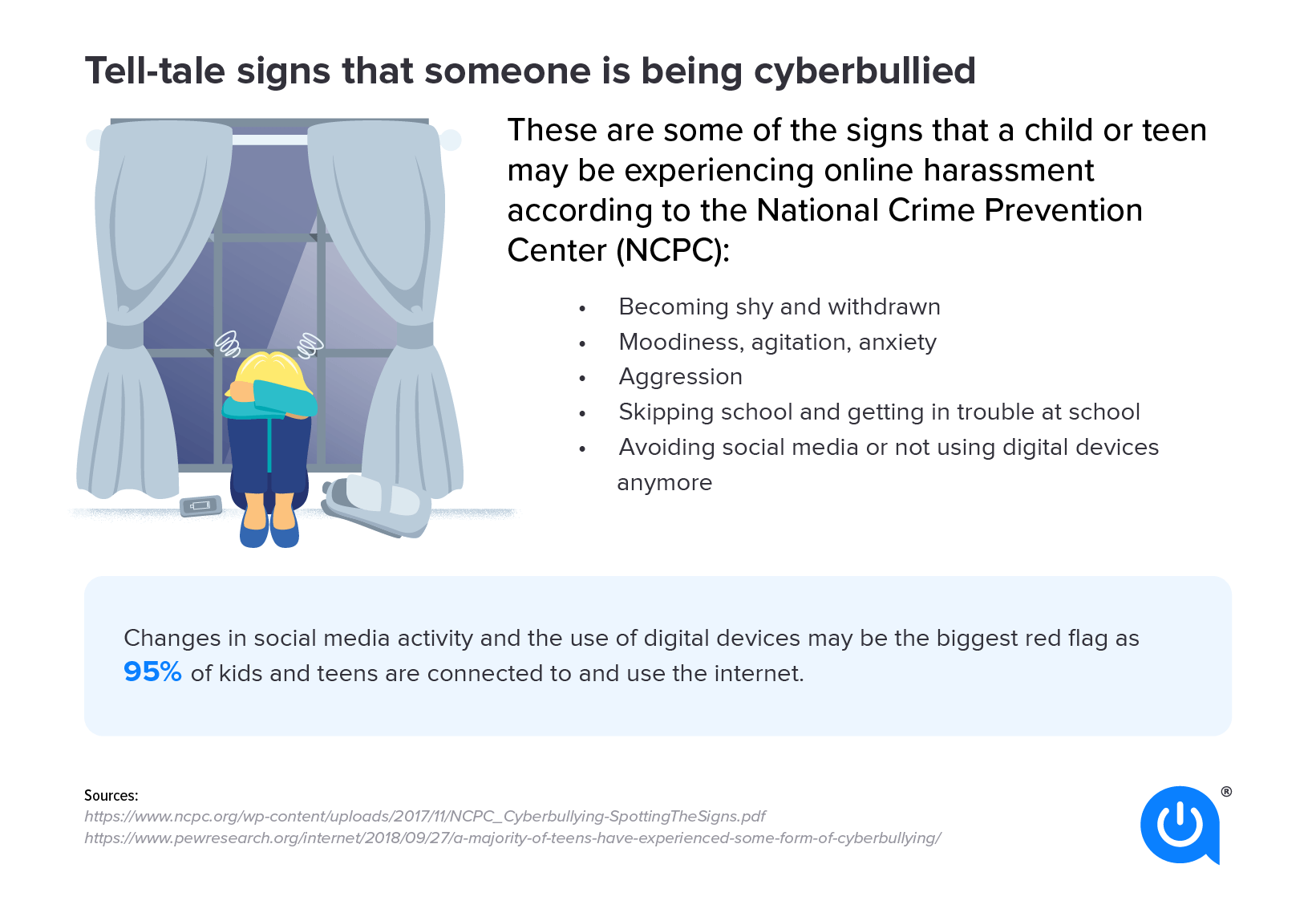Similar to how a playground or workplace bully will terrorize someone in person, a cyberbully will harass and threaten their targets through various forms over the internet.
As our world becomes increasingly digital, dangers like cyberbullying that plague the online world continue to increase as well. COVID-19 unfortunately exacerbated online bullying since millions of students were exclusively taking courses online and relying on the internet for most types of social interaction.
This increase in screen time throughout 2020 caused an immense spike in cyberbullying, with nearly 50% of students between the ages of 10 and 18 reporting that they were cyberbullied during the pandemic.
Though it is now a post-COVID world, cyberbullying still remains a prevalent issue in adolescent society. As social media continues to dominate the digital space, cyberbullying is affecting younger age groups. 1 in 5 tweens (9-12 years old) have encountered cyberbullying in some form, mainly on social media apps like Snapchat, TikTok and YouTube and even some gaming apps. It continues to affect teens as well with 45.5% of teens claiming they have been cyberbullied in their lifetimes.
Cyberbullying may look different in each age group, but it is undeniable that the acceleration of online activity and social media use has led to increases in online bullying that affects self-esteem, physical health, mental health, education and many other facets of adolescents’ lives.
What is cyberbullying and what does it look like?
Even though cyberbullying isn’t face-to-face, the effects can still be detrimental to the person experiencing the bullying. In fact, emotional distress can be even more severe when online bullying occurs anonymously. And the bullying is more likely to occur for a longer stretch of time since there are no immediate repercussions for a cyberbully.
Cyberbullying can occur through various online avenues, but here are some of the most common forms of cyberbullying among kids and teens:
- Cyberbullying through chat rooms associated with work or school topics
- Harassment on social media platforms
- Online rumors
- Purposefully leaving someone out of a chat or online group
- Threatening emails
- Anonymous apps
- Harmful text messages
- Compromising pictures
What are the effects of cyberbullying?
When you are the target of cyberbullying, it can feel like you have no online safe place to retreat. You may feel like you can’t escape since cyberbullying doesn’t always have a face or provide anything tangible to confront. The long-term effects on an individual can be devastating and can include:
- Emotional abuse: feeling hurt and ashamed of being who you are and what you stand for. This can lead to losing interest in the things that you love.
- Physical abuse: feelings of being overwhelmed that can lead to fatigue, sleepless nights, headaches, stomach aches and panic attacks.
- Mental abuse: Uncontrolled anger, feelings of inadequacy, embarrassment and more can lead the victim to shut down completely.
What to do if you are being bullied online
The most important thing to remember is that even though you are a target of cyberbullying, this is not your fault and you are never alone.
Here are some of the most important next steps you should take:
- Remain calm and make sure to breathe
- Try not to reply to any threatening or antagonizing comment
- Record any information that you can and save screenshots
- Block and don’t communicate with the bully
- Make sure you know who your friends are
- Talk to a trusted adult
- Report the abuse and move forward with next steps
What next steps look like
There are no federal laws against cyberbullying so what future steps can look like for you will depend on your state’s laws. Most state laws, policies and regulations require school districts to implement a bullying policy and ways to investigate and respond to these situations. Some states also require bullying prevention programs and teacher development programs. A good place to start is by reporting bullying to your school district. They will be able to conduct an investigation for you and walk you through the whole process.
How to ask for help from a trusted adult
If you are experiencing bullying, it’s not always easy to talk to someone else about it or bring it to a trusted adult, but there are steps you can take. Here are some of the best things to keep in mind:
- Have a game plan and choose a time to talk to your chosen adult and make sure to explain that you are having a problem and may need their help
- They might not always know what new technology is out there, so be prepared to explain how the platform works and try to tell them everything
- They might not immediately have the right information to help, but you can work together to solve this situation and become one step closer to helping yourself
Distinguish the difference
Sometimes, a person’s inappropriate sense of humor or maturity level can lead to a misconception that they are being purposefully hurtful toward you.
If you know this person and are having trouble identifying their motives, it can be useful to let them know how they are coming across to you.
Simply telling the person that their comment was hurtful and asking them if that’s how they meant it to come across is enough for the unintentional bullying to immediately stop.
If the person continues this behavior after you have talked to them, then this is cyberbullying. Stop engaging with them and gain the support of a trusted adult.
Ways to prevent future cyberbullying
You do not have to feel stifled or that you cannot be yourself while sharing information online, but there are ways to protect yourself and your information from being manipulated
- Understand what makes you comfortable and happy when sharing information, but be cautious when sharing anything online because it may stay online forever and could be harmful later.
- Don’t give out personal information
- Set certain preferences on your account so you can control who sees your information or comments both directly and indirectly
- Know the ways you can report certain comments and adjust your privacy setting to best suit your situation
- It is okay to unfriend or block individuals if you are not feeling comfortable
- Choose who you want to see your posts/comments and be selective with your friends
How to help if you see or know someone who is being bullied
People who are being bullied tend to isolate themselves and feel very alone. Therefore, just by reaching out or acknowledging the issue can help the person significantly. Here are some of the best ways to help someone who is experiencing online bullying:
- Let the individual know that what is happening is not okay and that it is not their fault
- Be open-minded and don’t assume you will know the whole story
- Ask them how they are feeling and listen to their answers
- Offer to talk through the situation and go with them to find help
- Keep the conversation positive and emphasize your willingness to help
- Do the research on how you can help and where you can direct an individual to help themselves
Tips for parents and recognizing cyberbullying
Signs your child may be getting bullied:
- Being emotionally upset during or after using the internet or phone
- Being very secretive or protective of one’s digital life
- Spending more time than usual in their room
- Withdrawal from or lack of interest in family, friends and activities
- Avoiding school or group gatherings
- Slipping grades and “acting out” in anger at home
- Changes in mood, behavior, sleep or appetite
Tips for parents to support their children
As a parent, you face many day-to-day challenges and may not know what to do if you find out your child is being bullied. Here, we outline some important steps you can take to support your child if they are being bullied.
Provide comfort and support
Let your child know that they are not alone in their struggles. You can talk about similar experiences you may have had or simply give them the safe space to talk about how they are feeling.
Notify the school
Tell school management about your child’s situation. Many school districts have policies in place to investigate and respond to bullying. It’s important your child knows you plan on telling the school, but if they are not comfortable with this course of action make sure to respect their wishes and discuss alternate solutions.
Keep records
Keep records of evidence of the cyberbullying occurrences—take screenshots of messages, pictures or anything else that can be used to support your child’s case of cyberbullying, whether it’s to the school, other parents or even law enforcement.
Limit access to technology
Keep your child’s devices in a space where you can monitor their use—your child may find it hard to resist looking at their computer or phone during this time, but limiting their exposure can be an important part of dealing with cyberbullying. Many apps, websites and phones also have parental controls that you can use to monitor your child’s screen time.
Get help
If your child is willing, organize time for them to meet with a therapist, school counselor, teacher or anyone else they may trust to discuss any emotional struggles they may be experiencing.
How the digital divide affects cyberbullying
Post-COVID, the students who are often the victims of cyberbullying are those who lack consistent access to the internet. The digital divide that exists between those who have internet and device access and those who don’t not only affects learning opportunities, but also social interactions.
The students who are not able to consistently talk to their peers because they lack the internet access to do so, tend to be more isolated socially and, therefore, can be more likely to be the victims of cyberbullying.
The pandemic added more urgency to the argument to swiftly close the digital divide as students’ education, social lives and emotional well-being are more on the line than ever before.
Resources
If you are a victim of cyberbullying or know someone who is, here are some of the best resources for help.
- American Psychological Association: Advice for parents, teachers and students regarding bullying
- CyberBullyHelp: Resources for managing cyberbullying provided by cyberbullying experts
- Cyberbullying Research Center: Information and statistics on cyberbullying in the U.S.
- Committee for Children: Offers a bullying prevention program
- It Gets Better Project: Advice specifically for those in the LGBTQ+ community
- National Bullying Prevention Center: Helps educate communities about how to prevent bullying
- StopBullying.gov: Resources provided by the government for bullying prevention
- National Suicide Prevention Lifeline: A lifeline that offers confidential support to those in crisis
- Resources for Youth in Crisis: Various resources young people can use if they are struggling
Helpful hotlines
-
STOP BULLYING NOW HOTLINE (USA) 1-800-273-8255
- Helpline set up by the U.S. Department of Health and Human Services
- Available 24/7
-
KIDS HELPLINE (AUS) 1-800 55 1800
- Advice for children, parents and schools
- Available 24/7
-
NSPCC HELPLINE (UK) 0808 800 5000
- If you are an adult concerned about the safety of a child
- Available 24/7
-
Advice for parents on bullying and mental health
- Open Monday-Friday 9:30am-4:00pm
- KIDS HELP PHONE (CANADA) 800-668-6868
- Available 24/7
- Bilingual
- Advice for children and youths
Apps
ReThink: ReThink is a free app that detects offensive language that someone is about to post and alerts them that they should rethink that choice. They claim that when adolescents are alerted to rethink their decisions, they change their minds 93% of the time.
KnowBullying: The KnowBullying app was created by the Substance Abuse and Mental Health Services Administration (SAMHSA) and helps parents talk to their kids about bullying
FamiSafe: FamiSafe is a parental control app that allows parents to monitor screen time, online activity, browser history, filter content and more.
Net Nanny: Net Nanny is another parental control app that allows parents to monitor web activity, limit screen time and filter content.
My Mobile Watchdog: My Mobile Watchdog allows parents to monitor their children’s text messages, contacts and call history, as well as block apps, websites and more.
FAQs
Even though cyberbullying takes place over the internet, it is still bullying. It can have extremely negative effects on mental health, sometimes causing anxiety, depression and other long-lasting emotional effects.
Some ways you can prevent or manage cyberbullying are protecting your accounts and devices, using privacy tools and settings, keeping your personal information private, blocking and reporting individuals that make you feel uncomfortable and teaching and learning about the importance of thinking before you put anything on the internet.
If you are concerned someone close to you may be a victim of cyberbullying, they may seem emotionally upset during or after using the internet, are secretive or protective of their digital life, spend too much time in their room, are withdrawn and display a lack of interest in friends, family or activities, avoid school or group gatherings or display changing mood, behavior, sleep or appetite.
Allconnect: Let us compare providers for you
Why should you choose Allconnect? We’re the #1 broadband marketplace in the U.S, meaning you can trust us to search, compare and order internet and TV service for your home.
Get started

Written by:
Ari HowardAssociate Writer, Broadband & Wireless Content
Ari Howard is a staff writer Healthline and spent two years as a writer on the Allconnect team. She specialized in broadband news and studies, particularly relating to internet access, digital safety, broadband-…
Read more
Edited by:
Robin LaytonEditor, Broadband Content
-
Featured
![5 of the best parental control apps to keep your children safe online]() 5 of the best parental control apps to keep your children safe online Robin Layton — 2 min read
5 of the best parental control apps to keep your children safe online Robin Layton — 2 min read -
Featured
![Keep your kids safe online: All you need to know about internet safety at school and home]() Keep your kids safe online: All you need to know about internet safety at school and home David Anders — 11 min read
Keep your kids safe online: All you need to know about internet safety at school and home David Anders — 11 min read -
Featured
![Does incognito mode on your computer protect your privacy?]() Does incognito mode on your computer protect your privacy? Ari Howard — 3 min read
Does incognito mode on your computer protect your privacy? Ari Howard — 3 min read
Latest
-
Thursday, July 25, 2024
Worried about losing your signal? This is how to keep your satellite dish cleanDavid Anders — 6 min read
-
Tuesday, July 23, 2024
The best free TV and movie streaming services 2024Camryn Smith — 5 min read
-
Tuesday, July 23, 2024
Everything you need to know about internet speedsRobin Layton — 8 min read









